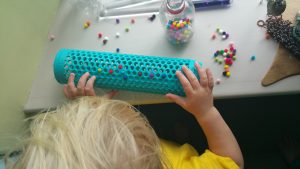Develop your sensory lexiconary to improve your ability to support the children in your care by Joanna Grace
16th May 2017
Share this entry:

On the develop your sensory lexiconary courses I take delegates through the development of seven sensory systems looking at what makes for an engaging experience at each stage of development. If you support learners who are still developing their sensory abilities, or learners who need to practice those abilities a little before they are fully functional, then knowing what will appeal at each stage of development is a wonderful tool to have in your belt.
If you are thinking “Seven sensory systems?” then you might like to take a peak at my last blog post How many senses?
But what does it mean when I talk about engaging experiences at each stage of development?
We tend to think of senses as either being there or not being there. Either a person has eyes that work and has them open and can see, or their eyes don’t work, or their eyes are shut and they can’t see. But it is not so cut and dry, in fact as well as the development of the senses there are a lot of other factors to consider which I cannot go into here suffice to say the brain is a very important organ when it comes to successfully sensing, you can have a perfect pair of eyes but if your brain is not working right you will not be able to see.
For now we are going to focus on the development of the senses. We can think of this as being like a curriculum. You want to offer the children in your care the content of that curriculum that is relevant to their development. If you were teaching a child maths you would not present them with all the maths you know in the world as a starting point. You would begin with experiences of one and many, and move on to counting, and then to addition and subtraction, and then multiplication and division, and so on, until you reach complex algebra and beyond. For some children being presented with the entire multi sensory world is like being faced with all the maths on the board, they need targeted experiences focused on where they are in their development in order to be able to progress to making sense of it all.
We are none of us born with senses that just work instantly; we learn how to use them through our experience of the world. Most 
Finding out what experiences are easiest for our senses to respond to in the early stages of development will enable you to create a sensory curriculum for those children and support them in progressing through that curriculum.
If you would like to find out more about what is likely to engage a child in early sensory development book onto a Develop your sensory lexiconary course or read Sensory-being for Sensory Beings (due for publication by Routledge on the 6th of September).
For more information about The Sensory Projects please visit Joanna’s website.
Click here to register for your free tickets to attend Childcare Expo Manchester on 16th & 17th June 2017.
Why attend Childcare Expo?
Join over 2,500 like-minded individuals from the early years sector who are dedicated to improving both practice and their childcare settings.
Attend educational seminars to credit your CPD
Meet the experts to have your questions answered
Receive fantastic onsite offers and discounts
Experience expert-led informative hands-on workshops
Network with peers and industry players
Pick up hundreds of new product ideas and services
And most of all, enjoy a great day out with your colleagues




